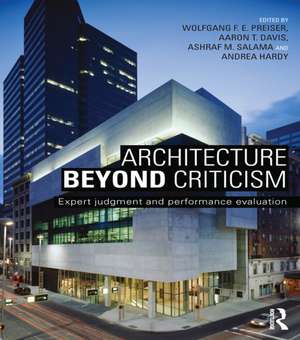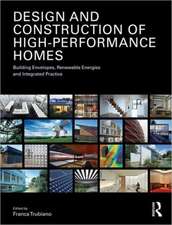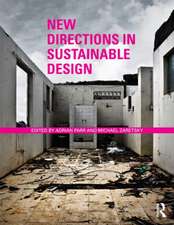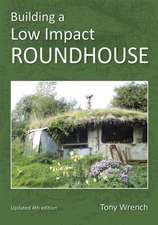Architecture Beyond Criticism: Expert Judgment and Performance Evaluation
Editat de Wolfgang F. E. Preiser, Aaron T. Davis, Ashraf M. Salama, Andrea Hardyen Limba Engleză Hardback – 15 dec 2014
As architecture takes more principled stances worldwide, from environmental sustainability to social, cultural, and economic activism, this book examines the roles of perceived and measured quality in architecture. By exploring in tandem both subjective traditional architectural criticism and environmental design and performance evaluation and its objective evaluation criteria, the book argues that both methodologies and outcomes can achieve a comprehensive assessment of quality in architecture.
Curated by a global editorial team, the book includes:
- Contributions from international architects and critics based in the UK, USA, Brazil, France, Qatar, Egypt, New Zealand, China, Japan and Germany
- Global case studies which illustrate both perspectives addressed by the book and comparative analyses of the findings
- A six part organization which includes introductions and conclusions from the editors, to help guide the reader and further illuminate the contributions.
Preț: 991.00 lei
Preț vechi: 1331.27 lei
-26% Nou
Puncte Express: 1487
Preț estimativ în valută:
189.69€ • 206.11$ • 159.44£
189.69€ • 206.11$ • 159.44£
Carte tipărită la comandă
Livrare economică 21 aprilie-05 mai
Preluare comenzi: 021 569.72.76
Specificații
ISBN-13: 9780415725323
ISBN-10: 0415725321
Pagini: 320
Ilustrații: 94
Dimensiuni: 174 x 246 x 20 mm
Greutate: 0.68 kg
Ediția:1
Editura: Taylor & Francis
Colecția Routledge
Locul publicării:Oxford, United Kingdom
ISBN-10: 0415725321
Pagini: 320
Ilustrații: 94
Dimensiuni: 174 x 246 x 20 mm
Greutate: 0.68 kg
Ediția:1
Editura: Taylor & Francis
Colecția Routledge
Locul publicării:Oxford, United Kingdom
Public țintă
Postgraduate and UndergraduateCuprins
Preface Acknowledgements Foreword Nigel Oseland Part 1: Introduction Wolfgang F.E. Preiser, Aaron T. Davis, Ashraf M. Salama, Andrea Hardy Part 2: Evolution and Role of Architectural Criticism 2. Identity Crisis: Estrangement in the Evolution of Architectural Criticism Aaron T. Davis 3. The Role of Editors as Critics Michael J. Crosbie 4. Is Curating the New Criticism? Pedro Gadanho 5. Architectural Radicalism and Criticism in Brazil Jose T. Lira 6. Superficial Material Similitude Galia Solomonoff 7. The Performance of Buildings, Architects, and Critics Thomas Fisher Reflections on Part 2 Daniel S. Friedman Part 3: Plurality of Perspectives on Criticism in Architecture 8. Media Coverage and Users' Reactions: Al Azhar Park in Cairo Re-examined Ashraf M. Salama 9. The Influence of the ‘Milieu’ on Architectural Criticism Yann Nussaume 10. Architectural Criticism and Building Evaluation in Germany Ursula Baus, Ulrich Schramm 11. An Analytical Critique of Cairene Urban Conservation Projects Remah Y. Gharib 12. Buildings and Their Use: The Dog That Didn't Bark Frank Duffy 13. Oblique Alternatives: Architectural Advancement Through Performance Paul Knox Reflections on Part 3 Daniel S. Friedman Part 4: Historical Review and Types of Building Performance Evaluation 14. Historical Review of Building Performance Evaluation Wolfgang F.E. Preiser, Andrea E. Hardy 15. Building Performance Evaluation in the UK: So Many False Dawns Bill Bordass, Adrian Leaman 16. Architectural Criticism and Building Performance Evaluation in China Clare Jacobson 17. Architectural Criticism Meets Building Evaluation in Japan Akikazu Kato, Gen Taniguchi, Shiho Mori 18. A Global Perspective on BPE as an Extension of Architectural Criticism Chris Watson Reflections on Part 4 Daniel S. Friedman Part 5: Architectural Analysis within Building Performance Evaluation 19. Using Scientific Research Methods in Assessing Visual Aesthetic Quality Jack L. Nasar 20. Performing the Urban Form-Based Codes as a Method of Architectural Critique Brenda C. Scheer 21. The Socio-cultural Context of Architectural Criticism and Evaluation Yasser Mahgoub 22. Quality Assessments in Health Care Environments Dina Battisto, Deborah Franqui, Clayton Boenecke 23. Building Performance Evaluations and Universal Design Korydon H. Smith 24. Regenerative Design: Redefining the Limits of Architectural Judgment Elizabeth Walsh, Steven A. Moore Reflection on Part 5 Daniel S. Friedman Part 6: Epilogue 25. Talking the Talk: About Architecture Ike Ijeh
Notă biografică
Editors Wolfgang F. E. Preiser, Aaron T. Davis, Ashraf M. Salama and Andrea Hardy represent an aggregate of cutting-edge architectural practice, consulting, research and lecturing on a global basis. They have a collective publication record of 25 books with major publishing houses from around the world. Senior editor Wolfgang F. E. Preiser has chaired national committees in the US, among others, for the National Academy of Sciences; Aaron T. Davis is an architect and building enclosure specialist and serves on the editorial board for the International Journal of Architectural History and Criticism; Ashraf M. Salama is editor of two international professional journals; and Andrea Hardy is an Architect-in-Training exploring the concepts of developing the public realm in growing desert cities.
Recenzii
‘Imagine if architects were trained to respond dynamically to their critics? Imagine if architecture critics practiced with sufficient rigor to be taken seriously by architects? This book is a brave and original attempt to bring together two antagonistic cultures. It points the way to a better-performing future—for critics, for architects, and for those of us, all of us, who would benefit from a built world capable of learning from the lessons of the present.’ - Philip Nobel, Editorial Director, SHoP Architects
'This is a provocative and fascinating examination of the dissolving boundaries between architectural criticism and building performance evaluation, from the historic roots of each to their evolving, sometimes contentious, relationship today. The international roster of contributing architects, planners, critics, and academics offer compelling arguments and case studies that should be fodder for debate in many spheres for many years to come.' - Kristen Richards, Hon. AIA, Hon. ASLA, Founder and Editor, ArchNewsNow.com, and Editor, Oculus magazine
‘Powerful building design tools and methodologies, coupled with advanced construction technologies, have enabled architects to create buildings increasingly complex in form and function. Yet assessment of architecture, especially in public media, remains highly subjective and qualitative, focused mostly on visual, contextual and historical attributes. Evidence-based evaluation and objective measurement of building performance - functional, technical, environmental, sociological, economic, and political - are rare in critical discourse. The diverse contributors to Architecture Beyond Criticism rigorously address these contrasting assessment paradigms and, often using place and project case studies, show why architectural criticism must become more comprehensive. Any professional who judges architecture - media critics, historians, design professors, practicing architects, and building engineers - should read this insightful, well researched book.’ - Roger K. Lewis, a fellow of the American Institute of Architects, is a practicing architect and urban planner; a Professor Emeritus of Architecture at the University of Maryland College Park; and an author and journalist
'Critique has long been considered a vital force in driving architectural excellence. Yet few educators understand the differences between good, actionable critical feedback and creatively limiting, negative feedback. This book invites both established educators and practitioner critics to consider some of the tacit agendas that influence design critique, and the role it has to play in shaping both the values and practices of tomorrows profession.' - Dr Harriet Harris, Principal Lecturer, Oxford Brookes University
'This is a provocative and fascinating examination of the dissolving boundaries between architectural criticism and building performance evaluation, from the historic roots of each to their evolving, sometimes contentious, relationship today. The international roster of contributing architects, planners, critics, and academics offer compelling arguments and case studies that should be fodder for debate in many spheres for many years to come.' - Kristen Richards, Hon. AIA, Hon. ASLA, Founder and Editor, ArchNewsNow.com, and Editor, Oculus magazine
‘Powerful building design tools and methodologies, coupled with advanced construction technologies, have enabled architects to create buildings increasingly complex in form and function. Yet assessment of architecture, especially in public media, remains highly subjective and qualitative, focused mostly on visual, contextual and historical attributes. Evidence-based evaluation and objective measurement of building performance - functional, technical, environmental, sociological, economic, and political - are rare in critical discourse. The diverse contributors to Architecture Beyond Criticism rigorously address these contrasting assessment paradigms and, often using place and project case studies, show why architectural criticism must become more comprehensive. Any professional who judges architecture - media critics, historians, design professors, practicing architects, and building engineers - should read this insightful, well researched book.’ - Roger K. Lewis, a fellow of the American Institute of Architects, is a practicing architect and urban planner; a Professor Emeritus of Architecture at the University of Maryland College Park; and an author and journalist
'Critique has long been considered a vital force in driving architectural excellence. Yet few educators understand the differences between good, actionable critical feedback and creatively limiting, negative feedback. This book invites both established educators and practitioner critics to consider some of the tacit agendas that influence design critique, and the role it has to play in shaping both the values and practices of tomorrows profession.' - Dr Harriet Harris, Principal Lecturer, Oxford Brookes University
Descriere
By presenting a systematic approach to assessing building performance, design professionals will learn how to improve building design and performance with major stakeholders in mind, especially end users/occupants.










